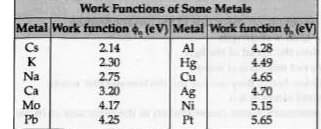Complete Solutions to TOPIC-1 PHOTOELECTRIC EFFECT (NUMERICAL PROBLEMS) of chapter DUAL NATURE OF RADIATION AND MATTER of Class 12 book with complete answers and questions
| Class 12 | PHYSICS |
| Chapter | DUAL NATURE OF RADIATION AND MATTER |
| OSWAAL PUBLICATION | TOPIC-1 PHOTOELECTRIC EFFECT (NUMERICAL PROBLEMS) |
| Number Of Questions | 15 |
| Academic Year | 2023-24 |
The threshold wavelength of a photosensitive metal is 662.5 nm. If this metal is irradiated with a radiation of wavelength 331.3 nm, find the maximum kinetic energy of the photoelectrons. If the wavelength of radiation is increased to 496.5 nm, calculate the change in maximum kinetic energy of the photoelectrons. (Planck's constant `h = 6.625 xx 10^(-34)` Js and `"speed of light in vacuum" = 3 xx 10^(8)ms^(-1)`)
View SolutionFor a metal the maximum wavelength required for photoelectron emission is 340 nm, find the work function. If the radiation of wavelength 250 nm falls on the surface of the given metal. Find the maximum kinetic energy of emitted photo electrons in eV. Given Planck's constant `= 6.625 xx 10^(-34) Js`, velocity of light in vacuum is `3 xx 10^(8)ms^(-1)`.
View SolutionWhen light of frequency `6 xx 10^(14)` Hz is incident on a photosensitive metal, the kinetic energy of the photoelectron ejected is 2e V. Calculate the kinetic energy of the photoelectron in eV when light to frequency `5 xx 10^(14)` Hz is incident on the same metal.
Given Planck's constant, `h = 6.625 xx 10^(-34) Js`, `1 eV = 1.6 xx 10^(-19)`.
View SolutionWhen the frequency of the incident light on a photo sensitive metal is changed from `7.6 xx 10^(14)` Hz to `6 xx 10^(14)` Hz the value of stopping potential changes by 0.66 V. Calculate Planck's constant. [Note : Any form of Einstein's P.E. Equation can be considered]
View SolutionThe work function of zinc is `6.8 xx 10^(-19)` J. What is the threshold frequency for emission of photoelectrons for zinc ?
Data: `W = 6.8 xx 10^(-19)`J, `v_(0)` = ?
View SolutionA metallic surface when illuminated with light of wavelength 3333 Å emits electrons with energies upto 0.6 eV. Calculate the work function of the metal.
Data : `lambda=3333 Å`, K.E=0.6eV, W=?
View SolutionLithium has a work function of 2.3 eV. It is exposed to light of wavelength `4.8 xx 10^(-7)` m. Find the maximum kinetic energy with which the electron leaves the surface. What is the longest wave length which can produce the photo electrons ?
Data : W = 2.3 eV, `h=6.626 xx 10^(-34)Js, e=1.6 xx 10^(-19)`C. Longest wavelength = ? , Kinetic energy = ?
View SolutionAt what speed is a particle moving if the mass is equal to three times its rest mass.
Data `m=3m_(0)`, v = ?
View SolutionHow fast would a rocket have to go relative to an observer for its length to be corrected to 99% of its length at rest.
Data: `(l)/(l_(0))=99% =(99)/(100)`, v = ?
View SolutionMonochromatic light of frequency `6.0xx10^(14) Hz` is produced by a laser. The power emitted is `2.0 xx10^(-3) W. `(a) What is the energy of a photon in the light beam? (b) How many photons per second, on an average, are emitted by the source?
View SolutionMonochromatic light of frequency `6.0xx10^(14) Hz` is produced by a laser. The power emitted is `2.0 xx10^(-3) W. `(a) What is the energy of a photon in the light beam? (b) How many photons per second, on an average, are emitted by the source?
View SolutionThe work function of caesium is 2.14 ev. Find (a) the threshold frequency for caesium, and (b) the wavelength of the incident light if the photocurrent is brought to zero by a stopping potential of 0.60 V.
View SolutionThe work function of caesium is 2.14 ev. Find (a) the threshold frequency for caesium, and (b) the wavelength of the incident light if the photocurrent is brought to zero by a stopping potential of 0.60 V.
View SolutionThe wavelength of light in the visible region is about 390 nm for violet colour, about 550 nm (average wavelength) for yellowgreen colour and about 760 nm for red colour. What are the energies of photons in (eV) at the (i) violet end, (ii) average wavelength, yellow-green colour, and (iii) red end of the visible spectrum? `("Take h "= 6.63xx10^(-34)" J s and 1 eV" = 1.6xx10^(-19)J.)`
View SolutionThe wavelength of light in the visible region is about 390 nm for violet colour, about 550 nm (average wavelength) for yellow-green colour and about 760 nm for red colour.
From which of the photosensitive materials with work functions listed given below and using the results of (i), (ii) and (iü) of (a), can you build a photoelectric device that operates with visible light ?

View Solution
TOPIC-1 PHOTOELECTRIC EFFECT (NUMERICAL PROBLEMS) questions and complete solutions for chapter DUAL NATURE OF RADIATION AND MATTER of OSWAAL PUBLICATION PHYSICS (KANNADA ENGLISH) of Class 12
All Exercises from OSWAAL PUBLICATION Class 12 PHYSICS DUAL NATURE OF RADIATION AND MATTER
- TOPIC-1 PHOTOELECTRIC EFFECT (LONG ANSWER TYPE QUESTIONS)
- TOPIC-1 PHOTOELECTRIC EFFECT (NUMERICAL PROBLEMS)
- TOPIC-1 PHOTOELECTRIC EFFECT (SHORT ANSWER TYPE QUESTIONS-I)
- TOPIC-1 PHOTOELECTRIC EFFECT (SHORT ANSWER TYPE QUESTIONS-II)
- TOPIC-1 PHOTOELECTRIC EFFECT (VERY SHORT ANSWER TYPE QUESTIONS)
- TOPIC-2 DE-BROGLIE RELATION (LONG ANSWER TYPE QUESTIONS)
- TOPIC-2 DE-BROGLIE RELATION (NUMERICAL PROBLEMS)
- TOPIC-2 DE-BROGLIE RELATION (SHORT ANSWER TYPE QUESTIONS-I)
- TOPIC-2 DE-BROGLIE RELATION (SHORT ANSWER TYPE QUESTIONS-II)
- TOPIC-2 DE-BROGLIE RELATION (VERY SHORT ANSWER TYPE QUESTIONS)